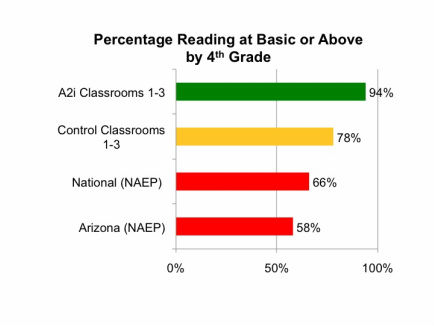
Seven Randomized Control Trials with over 2000 Students Demonstrates Rigor.
Dr. Carol Connor, recently recruited to ASU, envisioned and led all phases of research validating A2i’s significant efficacy as an innovative way to improve teachers’ implementation of effective differentiated reading instruction from kindergarten (K) through 3rd grade. This is borne out in seven randomized control field trials, with more than 2000 students in over 100 classrooms, funded by NIH and the US Department of Education. The results are described in 23 peer review journal articles and featured in Science magazine. From K through 3rd grade, students in the A2i classrooms showed significantly greater reading gains compared to students in control classrooms. Additionally, effects accumulated from 1st through 3rd grade: 94% of children in A2i classrooms all three years were reading at or above grade level compared to only 78% of children in control classrooms all three years and compared to the national average of 66% (in Arizona, an even more economically tragic, 58%) of 4th graders reading at basic or above levels according to the 2011 NAEP. Thus, in Arizona, for example, a fully deployed A2i would represent a 62% improvement over current state performance.
Of additional significance is that as a classroom-level intervention, A2i improved the outcomes for all children. In those same A2i classrooms cited above, the percentage of students achieving advanced or proficient level performance on NAEP was 75% of the whole compared to only 34% of the average US classroom. The average in A2i classrooms was reading at a fifth grade level. And these A2i classrooms had, on average, 50% of their students receiving free or reduced lunch, a marker for poverty.
The historical failure to achieve the literacy results being targeted by A2i is associated with increased referral to special education, grade retention, increased high school dropout rates, and juvenile delinquency. Each of these suboptimal results carries their own attendant costs of failure. As part of A2i’s innovative marketing plan, we collect base-line data from customer school districts on costs of remediation and track how they are affected as outcomes improve. Since A2i can deliver significantly higher student outcomes, we are able to reduce the cost of intervention and remediation as well as improve a community’s overall economic strength.
Entrepreneurial Team: Joseph A. Connor, JD/MBA, Founder/CEO Learning Ovations, Inc. Mr. Connor has held senior management, sales, marketing and operations position is two Fortune 100 companies. He has both started and strategically re-launched successful ventures in all three sectors - generating over a $billion dollars in incremental revenue. Steve H. Burchett, BS Finance, Chief Operating Officer, Learning Ovations, Inc. Mr. Burchett has 30+ years of Information Services experience. His specific roles have included in depth experience in business strategy and operations for venture capital start-up organizations. Carol McDonald Connor, Ph.D., Chief Research Officer, Learning Ovations, Inc. Arizona State University, Professor, Developmental Psychology and Senior Learning Scientist in the Learning Sciences Institute. Dr. Connor led the development of A2i software. She brings expertise in the areas of complex modeling including dynamic forecasting intervention models, quantitative and qualitative research methods, and statistics, including hierarchical linear modeling. She also brings expertise to developing and testing instruction, intervention and curriculum development, software development, professional development, and assessment. Elliot Amiel, MBA, Chief Financial Officer, Learning Ovations, Inc. Elizabeth Coyne Crowe, PhD Elementary Education, Director of Professional Development, Learning Ovations, Inc. Florida State University. Associate Florida Center for Reading Research. Dr. Crowe is a former elementary school teacher. She was an A2i research interventionist, working in classrooms alongside teachers using A2i software, providing training as well as technical assistance. She also led the team designing modules for on-line professional development.
To be tweeted links to my new posts -- blog, book reviews (both nonfiction and fiction), data or other recommended tools -- go to the workingdifferently.org Home page and click on the Twitter button on the right, just above the tweet stream, and follow me @jcrubicon.
 RSS Feed
RSS Feed
